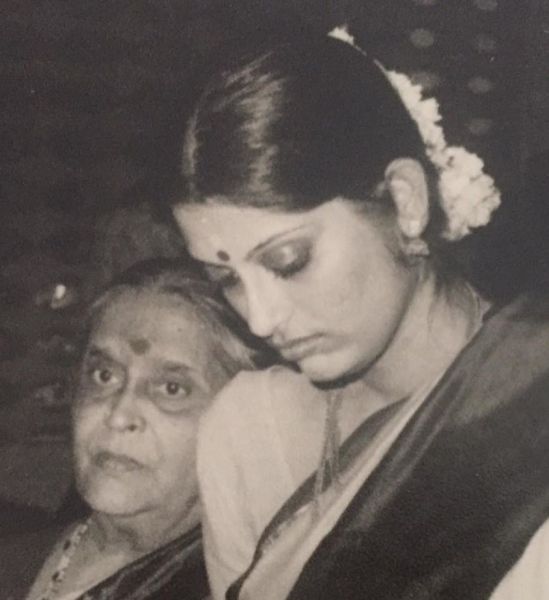Latest Contributions
War’s Consequences: A Mother’s Story
Category:

Meera was born and brought up in Madras, Tamil Nadu. She graduated from Stella Maris College with a B. in Sociology, and got her M.BA from the Asian Institute of Management, Manila. She has enjoyed living in Manila, Istanbul and Hong Kong, and currently lives in a suburb of Washington, DC with her husband.

L to R: Lakshmi Raman and Meera Raman. Madras (now Chennai).1982.
It was 1940. Nazi Germany invaded The Netherlands and shortly thereafter, the Dutch surrendered. The Dutch East Indies remained under occupation. Tumultuous and uncertain times compounded by the lingering threat of the Japanese made life unsafe for the young migrant family in the capital city of Batavia (now Jakarta).
The naive nineteen-year-old girl's life changed dramatically. She gathered her faith, her baby girls, (21/2 year and 10 months old) and the innocence of her youth to set sail to Colombo and eventually to India with her sister-in-law. Her husband and his two brothers remained to keep the business going, to help support their family back home in India.
She alternated her time between her parents and her in-laws. She enjoyed being with her parents, where she had few responsibilities. Life with her in-laws was austere. She was biding her time with the optimism of soon being united with her husband. Days and weeks turned to months and years - she lost all communication with him. The money in her bank account ran out, and she became dependent on her in-laws' meager resources. She respected and loved them for taking her into their fold without complaint but could not help longing for her old life - a life with adequate resources and freedom to make choices.
She deferred to and was in awe of her oldest brother-in-law, the family head and disciplinarian-in-chief. She refrained from reprimanding her children, lest their crying irritated him. Her heart ached to see her little ones walk the mile in their tiny feet to school. She cringed when her oldest sister-in-law teased her for being a novice, for not being conversant with the traditions. She tiptoed around them for fear of censure and ridicule. She sought the company of her mother-in-law and her daughters - they were kind, helpful and forgiving of her shortcomings.
Like all the female members of the family, she too owned only three sarees. She wore one, washed the other, and had one to spare. She wistfully remembered the days when her husband bought her more sarees than she needed while in Singapore. She consoled herself that she could at least make pretty dresses for her daughters, thanks to her sewing skills.
She learned to draw water from the well. During her monthly periods, she stitched together leftover fabric to use as pads, washed, and dried them out of sight of the family. She endured, lived in restraint, silenced her fears and tried to live with dignity.
Finally, when one brother-in-law returned from Batavia, she felt optimistic. Her husband was alive and she managed to speak to him by radio. Unfortunately, he was unable to give her any ideas of his plans. She continued to wait.
She suffered an attack of rheumatism. Her younger daughter developed pneumonia. Her mother-in-law and her girls nursed her with affection through agonizing days - she was ever grateful for their ministrations.
After the war ended, her husband and his brother returned. The girls, 7 and 5, went to receive him at the nearby railway station. They saw a skinny, stooped old man with a hacking cough instead of the person they had conjured him to be. They refused to acknowledge him as their father. The aghast family plied him with Ayurvedic medicines, inhalants, and massages until he recovered. She was grateful for his return\; her ordeal was over.
The years of separation had taken a toll on her - the uncertainties, the desperation, the frustrations. Fortunately, the experience did not kill her spirit or warp her mind. Instead, it taught her to value the support that sustained her and made her strong.
I prodded her on. "Tell me more," I implored. She was stubborn\; she did not want to remember. She had no photographs from which she could recall this chapter of her life. She had to rely on the grainy images of her fading memory to recount her tale. Remembering was painful. "That's quite enough," she said. I retreated.
______________________________________
© Meera Balasubramanian. Published 2019
Add new comment